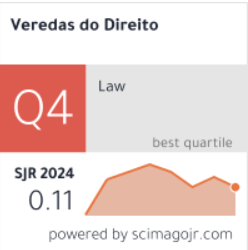THEORETICAL AND APPLIED PRINCIPLES OF THE ACTIVITIES OF THE PROSECUTOR'S OFFICE AND THE BAR IN COMBATING CRIME
DOI:
https://doi.org/10.18623/rvd.v22.n4.3702Keywords:
Prosecution, Advocacy, Crime Prevention, Criminal Justice, Legal Ethics, Artificial Intelligence, Digitalization, Rule of Law, Human Rights, Predictive Analytics, Legal Technology, Professional ResponsibilityAbstract
The present study examines the theoretical and applied foundations of the activities of prosecution and advocacy bodies in the prevention and counteraction of criminal offenses. In the context of contemporary legal systems, these institutions perform complementary functions aimed at maintaining the balance between public interests, individual rights, and the principles of the rule of law. The research highlights the evolving role of prosecution as a state guarantor of law enforcement, and advocacy as a professional guarantor of legal protection, emphasizing the necessity of coordinated interaction based on ethical principles, transparency, and respect for human rights. Particular attention is paid to preventive strategies, which focus not only on post-factum prosecution but also on the proactive identification of crime risk factors, including social, economic, and environmental determinants. The study analyzes the integration of information technologies and artificial intelligence (AI) in the operational and analytical activities of prosecution and advocacy bodies. Digitalization, electronic document management systems, AI-based case analysis, and predictive modeling are identified as key tools enhancing efficiency, accuracy, and speed in legal proceedings. At the same time, the research emphasizes the ethical and legal challenges associated with the use of AI, including algorithmic bias, transparency, and the protection of personal data, highlighting the central role of human oversight and professional judgment in the justice system. Drawing upon both domestic and international scholarship, the study provides a systematic assessment of organizational, procedural, and technological mechanisms for crime prevention and legal protection. It is argued that only an integrated approach – combining legal, ethical, and technological dimensions – can ensure effective prevention, timely detection, and impartial adjudication of criminal activities. The paper further stresses that the modernization of prosecution and advocacy institutions must align with the principles of democratic governance and the protection of fundamental rights, ensuring that technological innovations serve to enhance, rather than replace, human decision-making. The author concludes that the effectiveness of contemporary crime prevention and counteraction strategies relies on the harmonization of legal norms, professional ethics, and technological innovation. Proactive, data-driven, and ethically grounded approaches not only improve the capacity of prosecution and advocacy bodies but also contribute to the sustainability of the legal system and the protection of the rule of law in the digital era. This research offers a comprehensive framework for understanding the interplay of traditional legal principles with modern technological tools in advancing justice and preventing criminal conduct in complex, dynamic societies.
References
Council of Europe. (2009). Opinion on the Draft Law of Ukraine on the Office of the Public Prosecutor (CDL-AD(2009)048). Venice: Council of Europe.
Council of Europe. (2013). Joint Opinion on the Draft Law on the Public Prosecutor’s Office of Ukraine (CDL-AD(2013)025). Venice: Council of Europe.
Council of Europe. (2025). Fostering Human Rights in the Criminal Justice System in Ukraine — Phase II. Project Document, 3–4.
International Association of Prosecutors. (2023). Standards of Professional Ethics and Conduct. IAP, p. 6.
Lapkin, A. (2016). Some Problems of Prosecutor and Preliminary Investigation Bodies
Cooperation under the New Criminal Procedural Code of Ukraine. Jurnalul Juridic Național: Teorie şi Practică, 12–20.
Koval, M., & Soroka, S. (2025). Criminal law approaches to the analysis of crime prevention programs in the USA. Вісник Національного університету «Львівська політехніка». Серія:
Юридичні науки, 12(1), 72–78.
Mandalapu, V., Elluri, L., Vyas, P., & Roy, N. (2023). Crime Prediction Using Machine Learning and Deep Learning: A Systematic Review and Future Directions.
OECD. (2020). The Independence of Prosecutors in Eastern Europe, Central Asia and Asia Pacific. Paris: OECD Publishing.
Tudorică, A.-A. (2021). Modern aspects of crime prevention. Philosophy, Economics and Law Review, 1(1), 134–139.
Tychyna, D. (2017). Improvement of Public Prosecutors in the Mechanism of Prevention of Crime in Ukraine. Scientific Journal of the National Academy of Internal Affairs, 22(1), 88–98.
Vityuk, D. L. (2024). Кримінологічні принципи діяльності прокуратури в умовах збройного конфлікту. Науково-дослідницький інститут публічного права, 11–14.
Yefimov, V., & Sanakoyev, D. (2022). Theoretical approaches to the research of combating criminal offenses committed by organized groups and criminal organizations. Scientific Bulletin of Dnipropetrovsk State University of Internal Affairs, Special Issue, 1(120), 197–202.
Downloads
Published
How to Cite
Issue
Section
License
I (we) submit this article which is original and unpublished, of my (our) own authorship, to the evaluation of the Veredas do Direito Journal, and agree that the related copyrights will become exclusive property of the Journal, being prohibited any partial or total copy in any other part or other printed or online communication vehicle dissociated from the Veredas do Direito Journal, without the necessary and prior authorization that should be requested in writing to Editor in Chief. I (we) also declare that there is no conflict of interest between the articles theme, the author (s) and enterprises, institutions or individuals.
I (we) recognize that the Veredas do Direito Journal is licensed under a CREATIVE COMMONS LICENSE.
Licença Creative Commons Attribution 3.0







